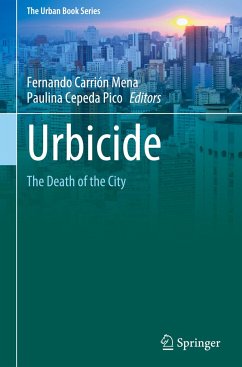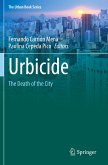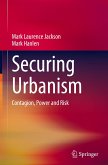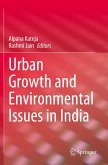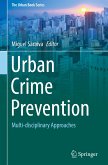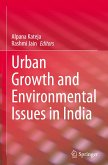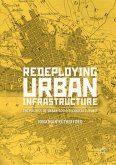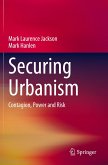Urbicide
The Death of the City
Herausgegeben:Carrión Mena, Fernando; Cepeda Pico, Paulina
Urbicide
The Death of the City
Herausgegeben:Carrión Mena, Fernando; Cepeda Pico, Paulina
- Gebundenes Buch
- Merkliste
- Auf die Merkliste
- Bewerten Bewerten
- Teilen
- Produkt teilen
- Produkterinnerung
- Produkterinnerung
This book uses the reflection of academics specialized in the urban area of Latin America, Europe and the United States, to initiate a comparative debate of the different dynamics in which Urbicidio expresses itself. The field or focal point of analysis that this publication approaches is the city, but under a new critical perspective of inverse methodology to that has been traditional used. It is about understanding the structural causes of self-destruction to finally thinking better and then going from pessimism to optimism. It is a deep look at the city from an unconventional entrance,…mehr
Andere Kunden interessierten sich auch für
![Urbicide Urbicide]() Urbicide153,99 €
Urbicide153,99 €![Securing Urbanism Securing Urbanism]() Mark Laurence JacksonSecuring Urbanism75,99 €
Mark Laurence JacksonSecuring Urbanism75,99 €![Urban Growth and Environmental Issues in India Urban Growth and Environmental Issues in India]() Urban Growth and Environmental Issues in India104,99 €
Urban Growth and Environmental Issues in India104,99 €![Urban Crime Prevention Urban Crime Prevention]() Urban Crime Prevention104,99 €
Urban Crime Prevention104,99 €![Urban Growth and Environmental Issues in India Urban Growth and Environmental Issues in India]() Urban Growth and Environmental Issues in India104,99 €
Urban Growth and Environmental Issues in India104,99 €![Redeploying Urban Infrastructure Redeploying Urban Infrastructure]() Jonathan RutherfordRedeploying Urban Infrastructure64,99 €
Jonathan RutherfordRedeploying Urban Infrastructure64,99 €![Securing Urbanism Securing Urbanism]() Mark Laurence JacksonSecuring Urbanism75,99 €
Mark Laurence JacksonSecuring Urbanism75,99 €-
-
-
This book uses the reflection of academics specialized in the urban area of Latin America, Europe and the United States, to initiate a comparative debate of the different dynamics in which Urbicidio expresses itself. The field or focal point of analysis that this publication approaches is the city, but under a new critical perspective of inverse methodology to that has been traditional used. It is about understanding the structural causes of self-destruction to finally thinking better and then going from pessimism to optimism.
It is a deep look at the city from an unconventional entrance, because it is about knowing and analyzing what the city loses by the action deployed by own urbanites, both in the field of its production and in the field of its consumption. This suppose that the city does not have an ascending linear sequential evolution in its development but neither in each of its parts in the improvement process, showing the face that commonly not seen but others live.
The category used for this purpose is that of Urbicidio or the death of the city, which contributes theoretically and methodologically to the knowledge of the city, as well as to the design of urban policies that neutralize it. In addition, it is worth mentioning that the book has an inclusive view of the authors. For this reason, gender parity, territorial representation and the presence of age groups have been sought.
Hinweis: Dieser Artikel kann nur an eine deutsche Lieferadresse ausgeliefert werden.
It is a deep look at the city from an unconventional entrance, because it is about knowing and analyzing what the city loses by the action deployed by own urbanites, both in the field of its production and in the field of its consumption. This suppose that the city does not have an ascending linear sequential evolution in its development but neither in each of its parts in the improvement process, showing the face that commonly not seen but others live.
The category used for this purpose is that of Urbicidio or the death of the city, which contributes theoretically and methodologically to the knowledge of the city, as well as to the design of urban policies that neutralize it. In addition, it is worth mentioning that the book has an inclusive view of the authors. For this reason, gender parity, territorial representation and the presence of age groups have been sought.
Hinweis: Dieser Artikel kann nur an eine deutsche Lieferadresse ausgeliefert werden.
Produktdetails
- Produktdetails
- The Urban Book Series
- Verlag: Springer / Springer International Publishing / Springer, Berlin
- Artikelnr. des Verlages: 978-3-031-25303-4
- 2023
- Seitenzahl: 964
- Erscheinungstermin: 24. März 2023
- Englisch
- Abmessung: 241mm x 160mm x 54mm
- Gewicht: 1765g
- ISBN-13: 9783031253034
- ISBN-10: 3031253035
- Artikelnr.: 66914417
- Herstellerkennzeichnung
- Springer-Verlag GmbH
- Tiergartenstr. 17
- 69121 Heidelberg
- ProductSafety@springernature.com
- The Urban Book Series
- Verlag: Springer / Springer International Publishing / Springer, Berlin
- Artikelnr. des Verlages: 978-3-031-25303-4
- 2023
- Seitenzahl: 964
- Erscheinungstermin: 24. März 2023
- Englisch
- Abmessung: 241mm x 160mm x 54mm
- Gewicht: 1765g
- ISBN-13: 9783031253034
- ISBN-10: 3031253035
- Artikelnr.: 66914417
- Herstellerkennzeichnung
- Springer-Verlag GmbH
- Tiergartenstr. 17
- 69121 Heidelberg
- ProductSafety@springernature.com
Fernando Carrión Mena graduated from Facultad Latinoamericana de Ciencias Sociales. He is Academic at Flacso Ecuador. Its focuses of study are the topics of housing, urbanization process, city, historical centers, cultural heritage, violence, security and drug trafficking, borders, decentralization and the sociology of soccer, among others. He created 8 thematic magazines (political science, security, city, historical centers, borders), wrote more than 1,000 journalistic articles and 306 academic ones, published 76 books (editor of 52 and author of 24) and published 12 book collections (97 volumes). He produced 4 film documentaries. He worked as a consultant for multilateral organizations and as a university professor. For his career, he won 9 awards, 6 decorations and 5 distinguished citizenship distinctions. He was the director of the CIUDAD Research Center, FLACSO, Municipal Urban Planning, as well as a consultant to the Municipality of Quito. He is considered one of the 50 most influential Ibero-American intellectuals. Paulina Cepeda graduated from Facultad Latinoamericana de Ciencias Sociales. She is Academic of FLASO-Ecuador. She is Architect by profession and completed Master of Research in Urban Studies with a research grant. She is Senior Architect, developing heritage housing restoration and rehabilitation projects, design and construction of new projects and urban consultancies to municipalities. Within the academic field, her lines of research are housing policies, urban planning, governance, market and land policies, with several articles and books on the matter. Coordinator of the Urbs.tic interurban Alliance dedicated to the development of critical thinking in the region, which brings together four universities: UNAM Mexico, FLACSO Ecuador, UNC from Argentina and UFRJ from Brazil. Founder of the Intercontinental Alliance for Urban Studies (AIEU) that brings together universities in southern Europe, Latin America and Africa and founder of POLIS.TIC, a local urban network.
Part 1: Introduction.- Introduction. Urbicidio: An unprecedented methodological entry in urban studies?- Part 2: Urbicidio. The death of the city.- Urbicide. The liturgical murder of the city.- Death by theory and the power of ideas: From theories of cities to "Smart" Cities.- Urbicide: Towards a conceptualization.- Urban order and disorder. Genealogy of urbicide.- Imaginaries and archetypes on the death of the city.- Covid 19 and the city: Reframing our Understanding of Urbicide by Learning from the Pandemic.- Part 3: Aniquilation: The end of the public space.- The ideology of public space and the new urban hygienism: Tactical urbanism in times of pandemic.- The transformation of urban and digital spaces from a democratic perspective.- Streets, avenues and highways.- The post-automobile city. From deterritorialization to the proximity city: The case of Madrid.- Mobility as an expression of the Urbicide: The risks of transport modernization in Latin American metropolises.- Part 4: Deterioration of the building environment.- The urbanization of risk.- Urbicide or suicide? Shaping environmental risk in an urban growth context: The example of Quito city (Ecuador).- Between greens and grays: Urbanization and territorial destruction in the Sabana de Bogotá.- Overregulation, corruption and Urbicide.- Obsolescence of the building environment.- Part 5: Dissolution of social interaction.- The (un)made city: Spatial fragmentation, social inequalities and (de)compositions of urban life.- The city and the abandonment of public space. Between neoliberal urbanism and citizen urbanism.- A "New" urban colonialism? North-South migration and racially structured gentrification in Latin America.- Urban frontiers in the fracturing city: Heritage, tourism and immigration.- The production of emptied places in the borderlands of the metropolitan area of Buenos Aires.- Part 6: Degradation and abandonment.- Reconstructing cultural paradigms. Experiences in East Europe: The historical memoryof the historical centers in Lithuania.- Lose the memory, lose the history, lose the city.- Revolt and destruction. The public and monument landscape in Latin American cities.- Trends of urban and territorial reconfiguration in metropolitan Buenos Aires.- Anatomy of an Urbicide. Social housing in Santiago 1980-2006.- Urbicide. A look through the mirror.- Part 7: Destruction of common life: Violence.- The besieged city: Geographies of crime.- Urbicide, violence and destruction against cities by criminal organizations.- Discursive understandings of the city and the persistence of gender inequality.- Border cities between life and death: Ciudad Juárez and El Paso.- Part 8: Contraction of public management: Privatization.- The metamorphosis of infrastructure in Latin American urbanization: From insufficiency to presence as fictitious capital.- Public policies (or their absence) as part of urban destruction.- Metropolitanicide? Urbs, polis and civitas revisited.- International tourism, urban rehabilitation and the destruction of informal income-earning opportunities.- De-urbanization: From the shock to the revolution of a new urban logic.- Part 9: Urbicide: Cities cases.- Grassroots spaces make London exciting: The relationship between the civitas and the urbs.- Rio de Janeiro: The trajectory of the wonderful city, violence, and urban disenchantment.- The implosion of memory. City and drug trafficking in Medellín and the Aburrá Valley.- Caracas. Urbicide and precariousness of urban life at the beginning of the Venezuelan 21st century. The worst of capitalism and savage populism.- Santiago, the non-city? Destruction, creation, and precariousness of verticalized space.- Neoliberal urbicide in Barcelona. The case of Ciutat Vella.- Part 10: Epilogue.- Epilogue. Remake us from Ruins, collective memories and dreams.- Epilogue. The power of urban destruction.
Part 1: Introduction.- Introduction. Urbicidio: An unprecedented methodological entry in urban studies?- Part 2: Urbicidio. The death of the city.- Urbicide. The liturgical murder of the city.- Death by theory and the power of ideas: From theories of cities to "Smart" Cities.- Urbicide: Towards a conceptualization.- Urban order and disorder. Genealogy of urbicide.- Imaginaries and archetypes on the death of the city.- Covid 19 and the city: Reframing our Understanding of Urbicide by Learning from the Pandemic.- Part 3: Aniquilation: The end of the public space.- The ideology of public space and the new urban hygienism: Tactical urbanism in times of pandemic.- The transformation of urban and digital spaces from a democratic perspective.- Streets, avenues and highways.- The post-automobile city. From deterritorialization to the proximity city: The case of Madrid.- Mobility as an expression of the Urbicide: The risks of transport modernization in Latin American metropolises.- Part 4: Deterioration of the building environment.- The urbanization of risk.- Urbicide or suicide? Shaping environmental risk in an urban growth context: The example of Quito city (Ecuador).- Between greens and grays: Urbanization and territorial destruction in the Sabana de Bogotá.- Overregulation, corruption and Urbicide.- Obsolescence of the building environment.- Part 5: Dissolution of social interaction.- The (un)made city: Spatial fragmentation, social inequalities and (de)compositions of urban life.- The city and the abandonment of public space. Between neoliberal urbanism and citizen urbanism.- A "New" urban colonialism? North-South migration and racially structured gentrification in Latin America.- Urban frontiers in the fracturing city: Heritage, tourism and immigration.- The production of emptied places in the borderlands of the metropolitan area of Buenos Aires.- Part 6: Degradation and abandonment.- Reconstructing cultural paradigms. Experiences in East Europe: The historical memoryof the historical centers in Lithuania.- Lose the memory, lose the history, lose the city.- Revolt and destruction. The public and monument landscape in Latin American cities.- Trends of urban and territorial reconfiguration in metropolitan Buenos Aires.- Anatomy of an Urbicide. Social housing in Santiago 1980-2006.- Urbicide. A look through the mirror.- Part 7: Destruction of common life: Violence.- The besieged city: Geographies of crime.- Urbicide, violence and destruction against cities by criminal organizations.- Discursive understandings of the city and the persistence of gender inequality.- Border cities between life and death: Ciudad Juárez and El Paso.- Part 8: Contraction of public management: Privatization.- The metamorphosis of infrastructure in Latin American urbanization: From insufficiency to presence as fictitious capital.- Public policies (or their absence) as part of urban destruction.- Metropolitanicide? Urbs, polis and civitas revisited.- International tourism, urban rehabilitation and the destruction of informal income-earning opportunities.- De-urbanization: From the shock to the revolution of a new urban logic.- Part 9: Urbicide: Cities cases.- Grassroots spaces make London exciting: The relationship between the civitas and the urbs.- Rio de Janeiro: The trajectory of the wonderful city, violence, and urban disenchantment.- The implosion of memory. City and drug trafficking in Medellín and the Aburrá Valley.- Caracas. Urbicide and precariousness of urban life at the beginning of the Venezuelan 21st century. The worst of capitalism and savage populism.- Santiago, the non-city? Destruction, creation, and precariousness of verticalized space.- Neoliberal urbicide in Barcelona. The case of Ciutat Vella.- Part 10: Epilogue.- Epilogue. Remake us from Ruins, collective memories and dreams.- Epilogue. The power of urban destruction.

